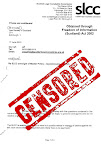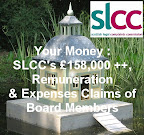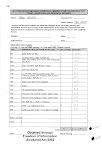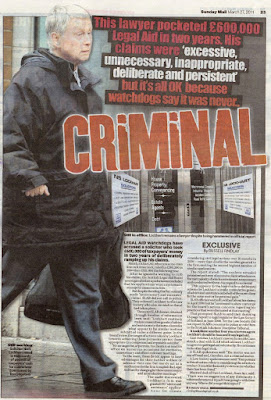Anti-client law complaints quango SLCC attempts to keep new Master Policy research secret. SECRET new research being carried out by the anti-client Scottish Legal Complaints Commission (SLCC) into the notoriously corrupt Master Policy & Guarantee Fund client compensation schemes operated by the Law Society of Scotland is so secret the public and media are being shut out of scrutinising the long running ‘half-hearted’ attempt by Scotland’s hapless regulator of complaints against the legal profession to fulfil a pledge in laws created at the Scottish Parliament in 2007 to investigate & oversee growing numbers of claims lodged by ripped-off clients for damages against hundreds of negligent, dishonest & ‘crooked lawyers’ in Scotland’s legal profession.
 Master Policy research secrets withheld by ‘independent’ law quango SLCC. Requests made to the SLCC under the Freedom of Information (Scotland) Act 2002 for more details on the nearly three year ‘ongoing’ research being carried out by the SLCC have resulted in scant release of information to the public, who are supposed to be the target of secret questionnaires, the wording of which has been the subject of heated arguments & debate within the SLCC & the Law Society of Scotland for well over a year. The SLCC have even refused to reveal how the questionnaires are to be released and what criteria is being used to select subjects from the many members of the public who have attempted to lodge claims against the Law Society of Scotland’s Guarantee Fund & Master Policy.
Master Policy research secrets withheld by ‘independent’ law quango SLCC. Requests made to the SLCC under the Freedom of Information (Scotland) Act 2002 for more details on the nearly three year ‘ongoing’ research being carried out by the SLCC have resulted in scant release of information to the public, who are supposed to be the target of secret questionnaires, the wording of which has been the subject of heated arguments & debate within the SLCC & the Law Society of Scotland for well over a year. The SLCC have even refused to reveal how the questionnaires are to be released and what criteria is being used to select subjects from the many members of the public who have attempted to lodge claims against the Law Society of Scotland’s Guarantee Fund & Master Policy.
 Something to Hide ? Scottish Legal Complaints Commission’s new Master Policy Research targets 657 claimants but the forms will be handed out by Marsh ! Little has been revealed of the new research in the releases of documents from the Scottish Legal Complaints Commission although one snippet of detail reveals the “SLCC to arrange for hard copies of the 657 questionnaires to be given to Marsh to send out to claimants.” with all other details from the key documents REMOVED. One of the few things to be revealed by the SLCC is this latest piece of research into the Master Policy is being carried out by Professor Frank Stephen of Manchester University’s School of Law, who co-authored the 2009 report on the Master Policy which documented client suicides and refusals by the Law Society of Scotland & US insurers Marsh to cooperate with the investigation.
Something to Hide ? Scottish Legal Complaints Commission’s new Master Policy Research targets 657 claimants but the forms will be handed out by Marsh ! Little has been revealed of the new research in the releases of documents from the Scottish Legal Complaints Commission although one snippet of detail reveals the “SLCC to arrange for hard copies of the 657 questionnaires to be given to Marsh to send out to claimants.” with all other details from the key documents REMOVED. One of the few things to be revealed by the SLCC is this latest piece of research into the Master Policy is being carried out by Professor Frank Stephen of Manchester University’s School of Law, who co-authored the 2009 report on the Master Policy which documented client suicides and refusals by the Law Society of Scotland & US insurers Marsh to cooperate with the investigation.
One MSP who studied the SLCC’s highly censored release of information queried why there was apparently only one member of the University of Manchester law team mentioned in the new survey where in the earlier 2009 report, there were two.
He said : “While I know Professor Frank Stephen very well, given his duties as advisor to the Scottish Parliament’s Justice Committee on particular pieces of legislation including the Legal Services Bill, I would have thought given the controversial nature of the subject matter under investigation, there should be additional academics brought in from outside the legal sector to ensure that impartiality and credibility is maintained if the results of this secret research are to be believed.”
 Secret briefings between the Law Society & SLCC over the Master Policy will remain secret for now. Even briefings between the SLCC & Law Society of Scotland were deemed so sensitive & so secret due to the intense corruption already revealed within the operation of the Master Insurance Policy that details of lengthy SLCC-Law Society meetings were also censored for fear of revealing bitter arguments & heated debates over demands from the legal profession and the insurers the research should not touch on key areas or cover some of the worst examples of claims already revealed in the 2009 report which documented clients who had committed suicide after being harangued by the legal profession over their claims against the Master Policy.
Secret briefings between the Law Society & SLCC over the Master Policy will remain secret for now. Even briefings between the SLCC & Law Society of Scotland were deemed so sensitive & so secret due to the intense corruption already revealed within the operation of the Master Insurance Policy that details of lengthy SLCC-Law Society meetings were also censored for fear of revealing bitter arguments & heated debates over demands from the legal profession and the insurers the research should not touch on key areas or cover some of the worst examples of claims already revealed in the 2009 report which documented clients who had committed suicide after being harangued by the legal profession over their claims against the Master Policy.
The SLCC’s intention to research claims made against the Guarantee Fund, a fund operated by the Law Society of Scotland which ‘requires’ all solicitors to pay into each year to cover the cost of ‘dishonesty’ in the legal profession where clients funds are fleeced or embezzled by their solicitors has also hit trouble, with the legal profession utterly resistant to any outside scrutiny of the large amounts of claims being made to the Fund, many of which date back over years, resulting in even more financial hardship to clients who have been financially ruined by their lawyers.
Again, the SLCC heavily censored the information regarding their attempt to investigate the Law Society’s Guarantee Fund, and most documents disclosed under Freedom of Information laws suffered severe censorship as can be seen below.
Something more to hide : Scottish Legal Complaints Commission’s Guarantee Fund Research is so secret clients of crooked lawyers should not be told about it.
A senior official from one of Scotland’s consumer organisations branded the SLCC’s investigations into the Master Policy & Guarantee Fund as “appalling” and claimed the law quango was trying to avoid its responsibilities to monitor claims to the Master Policy & Guarantee Fund, duties assigned to the SLCC by the Scottish Parliament in sections of the Legal Profession & Legal Aid (Scotland) Act 2007.
She said : “This is now the second piece of research commissioned by the Scottish Legal Complaints Commission into the Master Policy yet they have not even acted on many of the key findings of the first report in 2009. I do not believe the SLCC is genuinely motivated to make enquiries of either the Master Policy or the Guarantee Fund and they are simply trying to prolong the issue to the point no action will be taken with regard to its monitoring role.”
One client told how he ended up falling victim to what he called “a six year nightmare which tore his family apart” after he tried to claim compensation for the loss of over £120,000 & property titles to a crooked lawyer who still works and has connections to several Council members of the Law Society itself.
After being told of the secret new research being carried out by the SLCC into the Master Policy, he said : “The SLCC haven't asked me to participate in this survey and I know why. Its because I will tell the truth about what the Law Society and their insurers did to my family to stop me getting back what my solictor stole from me. The whole Master Policy thing is a scam from start to finish and no one gets back what has been taken from them as far as I can see.”
While the SLCC were not available for comment over the Easter period, a source close to the commission claimed its board were hoping the results of the new research could be used to discredit the earlier 2009 report and gloss over the most controversial findings & comments of that report, carried out by a two member University of Manchester team, Professor Frank Stephen & Dr Angela Melville, more of which can be read here : 'Ground-breaking' investigation into Law Society's Master Policy insurance reveals realities of corrupt claims process against crooked lawyers and here : Suicides, illness, broken families and ruined clients reveal true cost of Law Society's Master Policy which 'allows solicitors to sleep at night'
Suicides, illness, family breakdown, loss of homes, loss of livelihood were all identified by interviewees as being directly associated with members of the public’s dealings with the Law Society & Master Policy. During the research team's investigation of claims against the Master Policy, team members were told of suicides which had occurred due to the way in which clients of crooked lawyers had been treated by the Law Society of Scotland and the insurers who operate the Master Policy protection scheme for solicitors against negligence claims. Quoting the report : "Several claimants said that they had been diagnosed with depression; that they had high blood pressure; and several had their marriages fail due to their claim. Some had lost a lot of money, their homes, and we were told that one party litigant had committed suicide."
Law Society officials linked to suicide of client who claimed against the Master Policy. The suicide of one client who had dealings with the Master Policy, is apparently linked to senior officials at the Law Society of Scotland itself, who, when approached by the client to handle a complaint against his solicitor who had made major errors in handling legal business, recommended to the now deceased client he approach a well known firm of solicitors to sue his original solicitor and pursue a claim against the Master Policy for negligence. However, what the client did not know was the law firm which the now promoted Director of a department at the Law Society had recommended he approach, actually represented the Legal Defence Union, which exists to defend solicitors against both claims & complaints from clients, and who are involved in defending solicitors against over two thirds of the thousands of complaints made annually against lawyers by members of the public in Scotland.
The client, a farmer and co owner of a business, went onto unknowingly engage the law firm recommended to him by the still serving senior Law Society official, however, unsurprisingly, little or no progress was made over a lengthy period of time on the client's claim against the Master Policy, which in itself, caused severe stress and depression to the client and his family.
Matters reached the stage where the law firm, recommended to the client by the Law Society itself had done little on the case, and offered no hope of a just & fair resolution to the huge losses caused by the client's original solicitor, one evening, not long after yet another unsuccessful meeting with his solicitors, the client in question had reached a point of such depression, he committed suicide at home using a shotgun, leaving his widow & children. Several days after the client’s suicide, the same Law Society official who has been in charge of regulation for almost twenty years and who had recommended the law firm which had done nothing to proceed the deceased client's claim and take the original 'crooked lawyer' to court, wrote to the widow of the victim and callously informed her she had two weeks to make a complaint to the Law Society or she would be time barred.
The case itself, was investigated by the then Scottish Legal Services Ombudsman Linda Costello Baker, in 2001, who found the Law Society of Scotland had failed the deceased client and ordered they re-investigate the complaint. The Law Society then proceeded to investigate the complaints again, however reaching the same conclusions, which prompted the widow of the deceased client to return to the SLSO, Ms Costello Baker, who again investigated in 2003 and judged the Law Society had failed once more.
At least two other suicides directly associated with clients dealings with the Master Policy are known, where in both cases, clients appeared to have been put under intolerable pressure, delay, deceit and intimidation by lawyers, the Law Society itself, and the insurers to the Master Policy, that the result of the entire process was to cause the claimants to end their lives after breaking under the strain of dealings with the apparently deadly Master Policy insurance scheme.
Further excerpts from the Manchester University report into the Law Society's Master Policy & Guarantee Fund show the intolerable strain clients who attempt to claim against their 'crooked' solicitor have to endure : Claimants "described being intimidated, being forced to settle rather than try to run a hearing without legal support, and all felt that their claims’ outcomes were not fair. Some claimants felt that they should have received more support, and that this lack was further evidence of actors within the legal system being “against” Master Policy claimants. Judges were described as being “former solicitors”, members of the Law Society – and thus, against claimants. Some described judges and other judicial officers as being very hostile to party litigants."
SLCC Chair Jane Irvine ‘well aware of long running problems & corruption at the Law Society, Master Policy & Insurers’. Insiders at the Scottish Legal Complaints Commission claim Jane Irvine, the current SLCC Chair “is well aware” of the suicide case and many other difficulties encountered by clients attempting to register claims against the Master Policy & Guarantee Funds, many of which were brought to the attention of Ms Irvine and also her predecessor at the Scottish Legal Services Ombudsman, Linda Costello Baker, yet the SLCC has chosen to do nothing on its monitoring role after three years of operation and several of the SLCC’s board members now appear to exhibit intense personal prejudice against clients who dare attempt to claim back financial damages inflicted on them by their legal representatives.
One source close to the commission said over the weekend : “This is the Scottish do nothing Complaints Commission and they definitely do not want to hear about crooked lawyers. Jane Irvine and the rest of them know the score on the Master Policy but all the indications are they don't want to do anything about it just in case they reveal the truth we all know which is the Law Society and its insurers are rotten to the core. All the top brass seem to be concerned about these days is keeping money in the bank and holding onto their salary packages.”
The source continued : “Get Irvine to publish the reports on the Master Policy suicide case in Oban and you will see just how rotten the Law Society & Marsh really are.”













